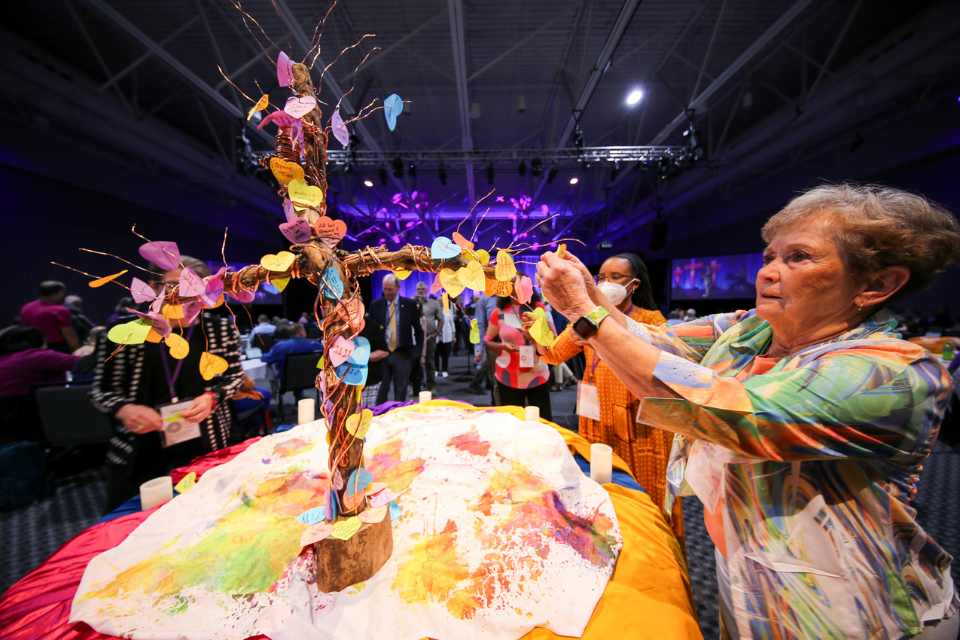Attendees of the 2024 North Central Jurisdictional Conference spent time reflecting on John Wesley’s three simple rules: do no harm, do good, and stay in love with God.
Each person registered for the 2024 North Central Jurisdictional (NCJ) Conference was given the book Three Simple Rules — A Wesleyan Way of Living by Bishop Rueben Job. The book, about John Wesley’s three simple rules, helps people apply faith to everyday life and not only live in a way that honors God but encourages them to work toward continual growth and development of their faith. Those three simple rules — do no harm, do good, and stay in love with God — acted as the theme and framed the topics for each of the first three days of the NCJ Conference.
Bishop Rueben Job interprets John Wesley’s General Rules in the book. His insightful work calls us to mutual respect, unity, and a deeper daily relationship with God.
Day One: Wednesday, July 10 — Do No Harm
Bishop Rueben Job said in his writing, “To do no harm means that I will be on guard so that all of my actions and even my silence will not add injury to another of God’s children or any part of God’s creation.”
Practicing “do no harm” is not as simple as those three little words because it is not about how we respond to others but about each of us. Taking this seriously, we might ask ourselves, “What impact might my words and actions have on my life and others?”
During the presentation on day one, delegates were asked to focus on “do no harm” and take time to reflect and seek guidance from God on the ways, intentional and unintentional, that they have been harmed or caused harm to others. Afterward, they took a moment to release the thoughts and actions of harm, wrote a word or phrase on a rock, and released it in a bowl of water.
Day Two: Thursday, July 11 — Do Good
The second simple rule theme for day two was “do good,” which focuses attention on the choices and actions of intentionally doing good to others. Doing good is not simply referring to “random acts of kindness” or “paying it forward,” but attuning one’s heart and life to what God would have us do to increase the greater good of all.
Bishop Rueben Job said this in his writing, “God of goodness, teach us today how to do good in every circumstance. We do not ask for the easy way, but we do ask for grace and strength to follow you in the path of goodness, peace, and love. Amen.”
Sometimes, it is hard to deny the simplicity of “do good.” What could be more direct? You could argue that this is one of those Nike messages: “Just do it!” But be ready for the follow-up question: “Do what?” Sometimes, the good that we are to do seems obvious; at other times, we must think and plan and wonder what we can do that is good but doesn’t cause harm elsewhere.
Focusing on the second of the three simple rules, seek guidance from God and reflect on the ways to “do good” in your daily life and faith.
During the presentation on day two, delegates were asked to write a word or two on a sticky note that described how they seek to do good and placed it on a cross in the center of the room.
Day Three: Friday, July 12 — Stay in Love with God
The third simple rule, “stay in Love with God,” suggests a more active role in our relationship with God. To stay in love with God requires some consistent action. The first two rules are about relationships with our neighbors, but this last one is about interactions and relationships with God.
When John Wesley spoke about keeping the ordinances of God, he described the practices that kept the relationship between God and humans vital, alive, and growing. He named public worship of God, the Lord’s Supper, private and family prayer, searching the Scriptures, Bible study, and fasting essential to a faithful life. Wesley saw these disciplines as central to any life of faithfulness to God in Christ.
Bishop Rueben Job studied Wesley and the Gospel words of Jesus that Wesley loved so dearly, and a paraphrase arose: “Stay in love with God.” Bishop Job said in his writing, “This rule keeps us in connection to the power of God, which can enable us to keep all three rules.”
An example is if someone is to stay married after the wedding, they must choose their spouse a hundred times a day. In the same way, to stay in love with God, we must choose God repeatedly and embrace every means of grace as a way to stick close to Jesus during our lives.
On the third day, delegates reflected on ways to “stay in love with God” in their daily life, wrote a word or two on a paper heart, and placed it on the cross.
Last Updated on July 13, 2024

